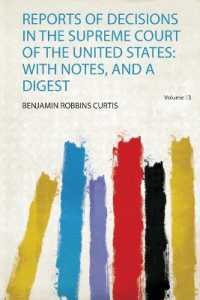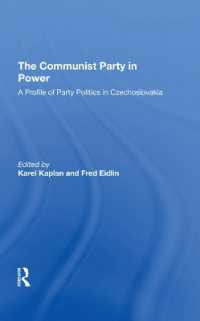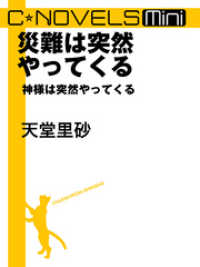- ホーム
- > 洋書
- > 英文書
- > Cinema / Film
Full Description
Matilda Mroz argues that cinema provides an ideal opportunity to engage with ideas of temporal flow and change. Temporality, however, remains an underexplored area of film analysis, which frequently discusses images as though they were still rather than moving.
This book traces the operation of duration in cinema, and argues that temporality should be a central concern of film scholarship. In close readings of Michelangelo Antonioni's L'Avventura, Andrei Tarkovsky's Mirror, and the ten short films that make up Krzysztof Kieślowski's Decalogue series, Mroz highlights how film analysis must consider both particular moments in cinema which are critically significant, and the way in which such moments interrelate in temporal flux. She explores the concepts of duration and rhythm, resonance and uncertainty, affect, sense and texture, to bring a fresh perspective to film analysis and criticism.
Essential reading for students and scholars in Film Studies, this engaging study will also be a valuable resource for critical theorists.
Contents
Introduction
Duration and Rhythm
Resonance and Uncertainty
Affect
Sense and Texture
L'Avventura, Mirror, Decalogue
1 Time, in Theory
Moments in Film Theory
Sensory and Affective Moments
Moments and Duration
2 L'Avventura: Temporal Adventures
Depth and Movement
Looking and Imaging
Temporalised Space
Pace and Rhythm
L'Avventura Today
3 Mirror: Trace and Transfiguration
Time and the Long-Take
Memory and Narration
Reflections on the Camera
Texture and the Senses
Aesthetic Transfiguration
Audiophilia
Mirrors and Crystals
4 Signs and Meaning in the Decalogue
Significance: Omens, Objects and Patterns
Temporality, narrative, and affect
Epilogue
Bibliography
Index








